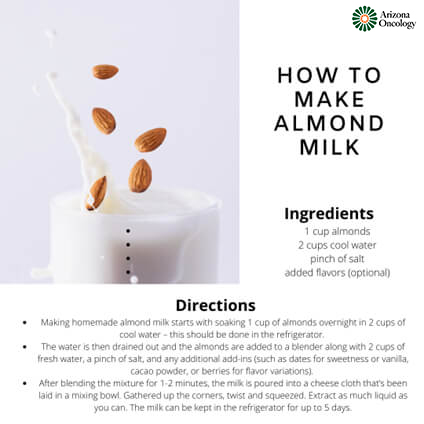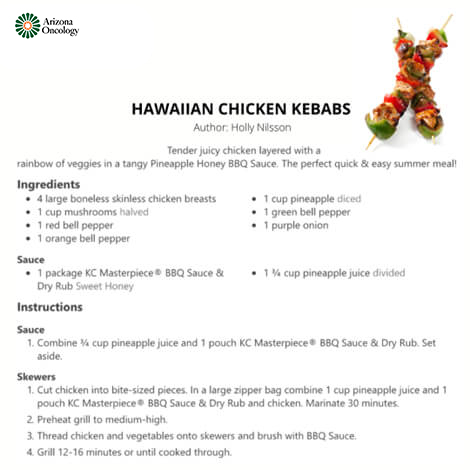Cancer treatments can lead to many nutrition-related challenges, including weight loss or gain, loss of muscle mass, and poor appetite. Side effects can also impact what and how you eat. Since a healthy diet is crucial to health and healing, Arizona Oncology physicians encourage their patients to take their nutritional needs seriously.
Common Nutritional Challenges for Cancer Patients
Nutritional support can help with many common side effects of cancer treatment. Here are some general tips that many cancer patients find helpful. Of course, cancers and cancer treatments differ, so be sure your oncologist approves any dietary changes.A nutritional counselor can work with your doctor to provide a more comprehensive, in-depth assessment and plan.
- Digestive Issues. For constipation, drinking warm or hot fluids in the morning may get your digestive tract moving. Avoid foods that contribute to gas or bloating. For diarrhea, a clear liquid diet initially can help. Steer clear of acidic juices and carbonated soft drinks.
- Nausea. Ginger and peppermint teas, card candies, or chews can be helpful. If nausea is putting you at risk for weight loss or nutrient deficiencies, work with a nutritional counselor to develop a customized eating plan that ensures your nutritional needs are met while addressing your symptoms.
- Mouth Sores and Mucositis. Suck on ice chips and drink beverages out of a straw to help avoid the areas of your mouth that hurt. Stick to soft, easy-to-swallow foods or cut your food into smaller pieces.
- Loss of Appetite/Weight Loss. Eat on a schedule rather than depending on hunger cues. Eat several small meals rather than fewer large ones.
- Taste and Smell Changes. Try swapping foods that are bothering you with something else from the same food group. Opt for fresh fruits and vegetables if the canned varieties leave a metallic taste in your mouth.
Learn more about nutrition for cancer patients at https://arizonaoncology.com/cancer-treatment-tips/diet-and-exercise/.

What to Eat After Cancer Treatment
When you’ve completed your treatment, there are things you can do to stay healthy and help prevent a recurrence. Eat a balanced diet full of healthy, non-processed foods and limit or avoid added sugar, trans fats, alcohol, red meat and refined carbohydrates. You can learn more about getting and staying healthy after cancer at https://arizonaoncology.com/nutrition-after-cancer/.

What is Nutritional Counseling?
Nutritional counseling is an ongoing process in which a registered dietician or nutritionist (RD/RDN) works with an individual to assess their dietary intake and make recommendations that help support their health needs. Your nutritional counselor may do the following:
- Review your current lifestyle, medical and nutritional history, and tailor recommendations to your specific needs.
- Evaluate your nutritional requirements before, during, and after cancer treatment.
- Promote recovery from cancer treatments through nutrition.
- Help manage side effects that affect your ability to stay nourished.
Where to Get Nutritional Counseling
Looking for more personalized help? Nutritional counseling is available through the Arizona Oncology Foundation at www.arizonaoncologyfoundation.org or by calling 520-235-6793. For more help, contact our Social Worker department at aosocialwork@usoncology.com.



